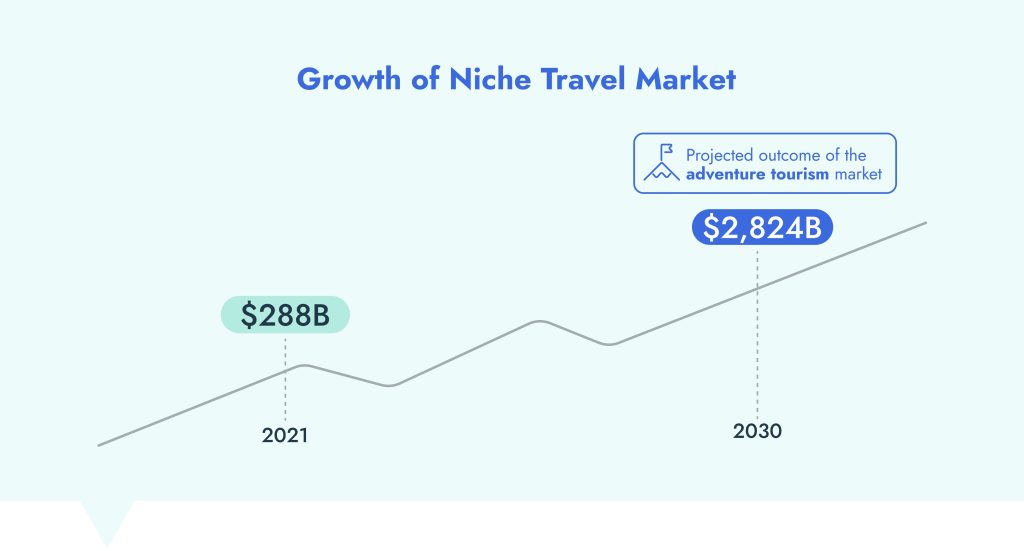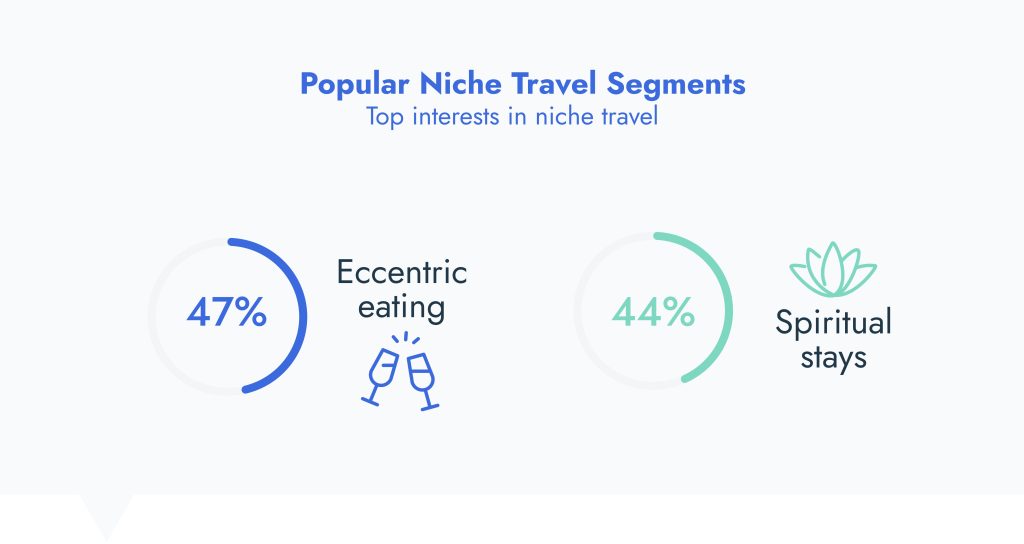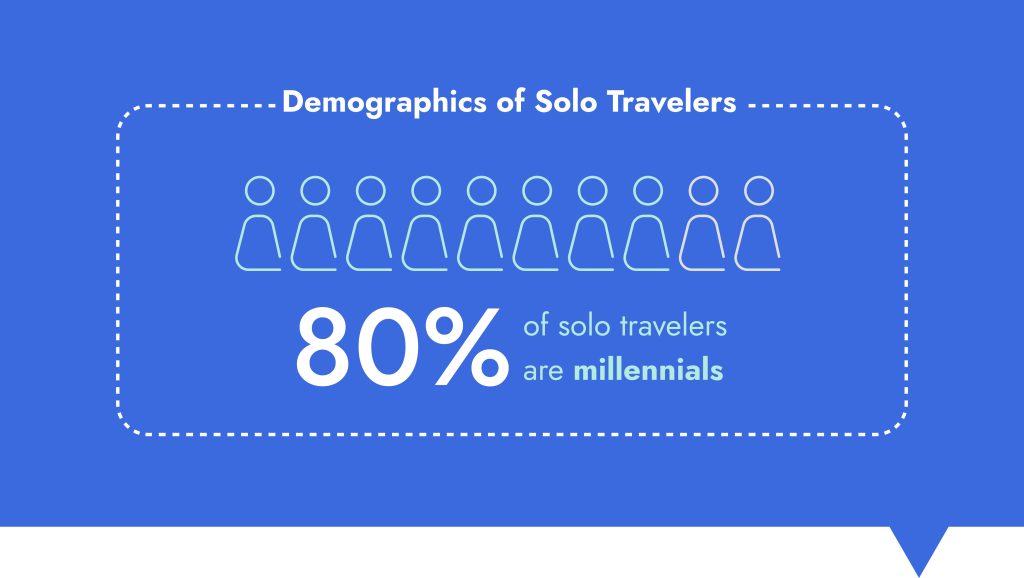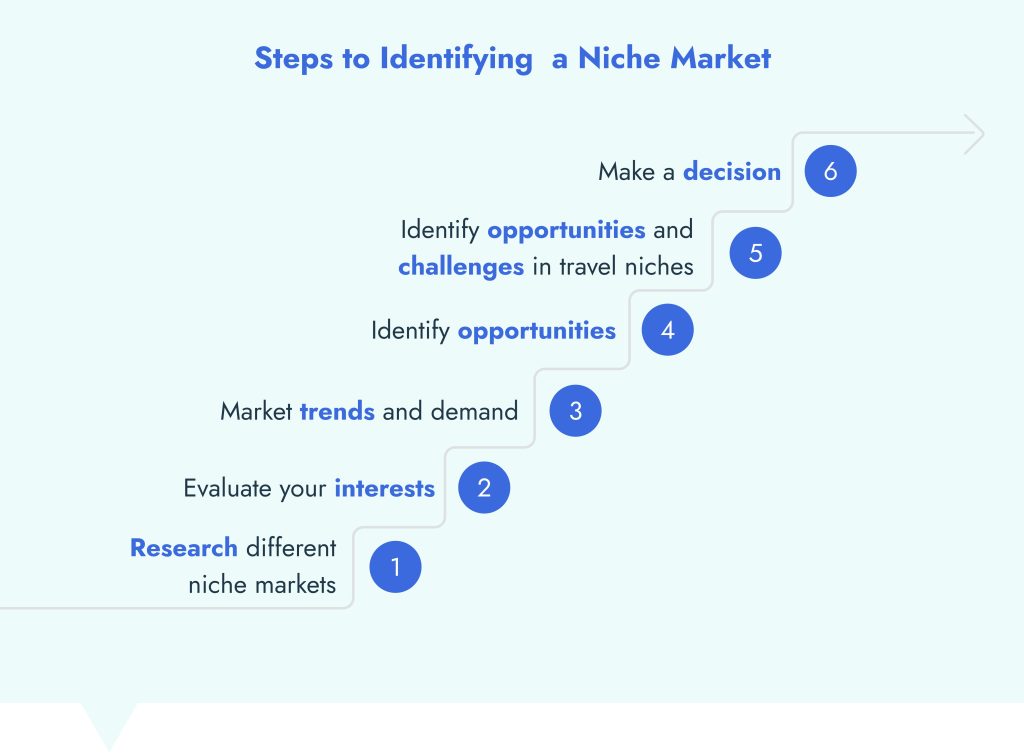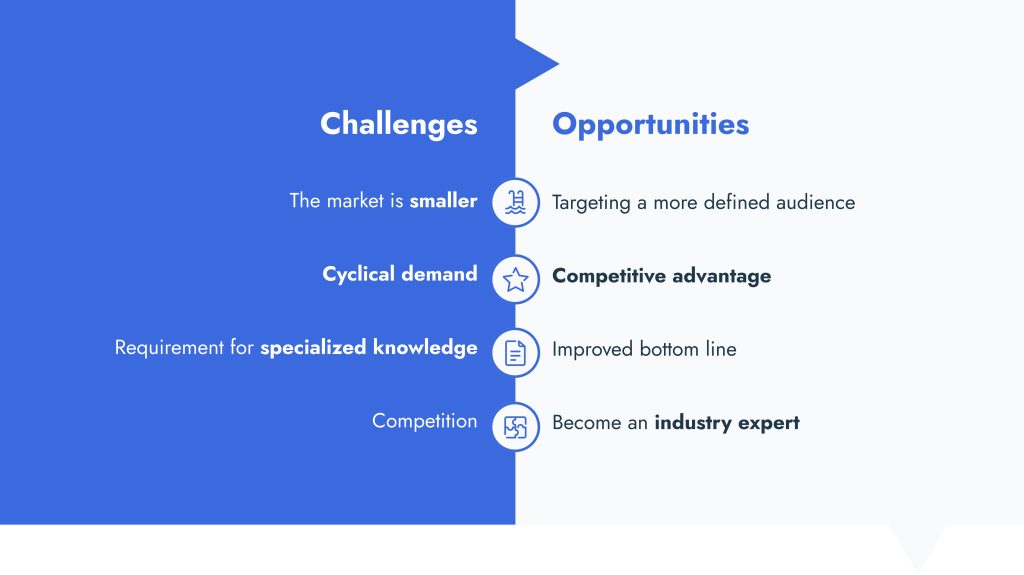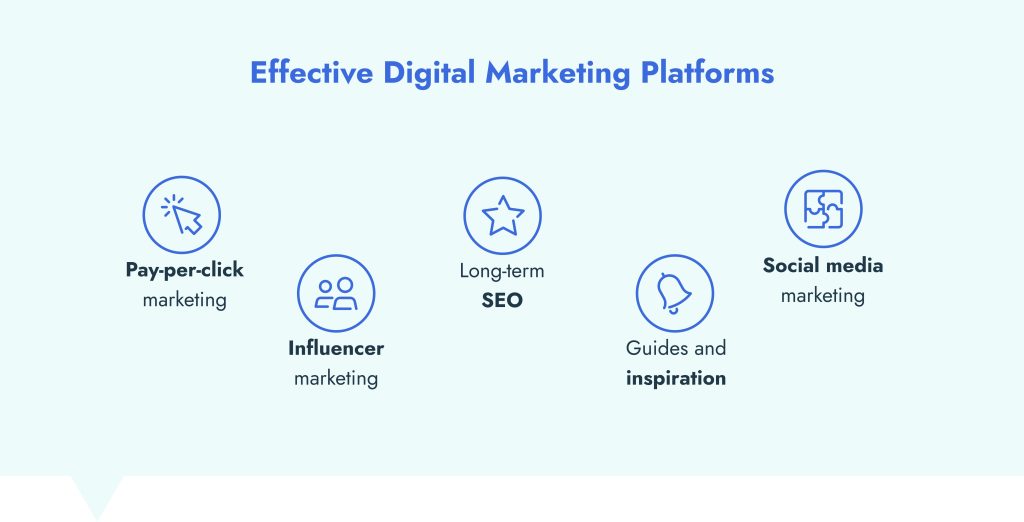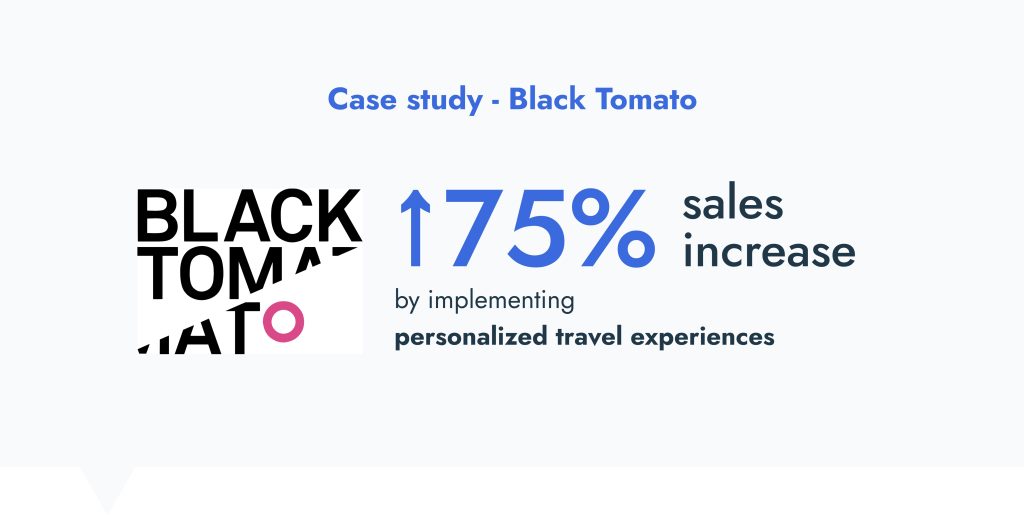Travel Niche: What It Is, How to Leverage It, Case Studies & More

Niche travel is one of the few travel sectors that have maintained their pre-COVID market growth. By catering to specific traveler segments, niche travel developed products around adventure travel, eco-tourism, LGBTQ+ travel, and wellness retreats. Take adventure tourism as only one segment of the niche tourism market.
In 2021, it reached 288 billion in size, and it’s projected to reach 2,824 billion by 2030. The other niche travel subsectors follow similar growth and expansion trends. What does it mean? The niche travel demand is growing, and it’s an excellent opportunity for your travel brand to capitalize on this trend.
What is the Travel Niche
Niche travel is a specific business methodology that travel brands can implement to reach new consumers and expand their revenue streams. It’s a simple concept to grasp – to be a niche travel agency, you must specialize in specific travel types and particular demographics. What does it mean precisely?
For instance, if you want to cater to a specific demographic, you can introduce packages and experiences catering to the needs of elderly consumers. Alternatively, you can focus on developing and offering products in a narrow category, such as adventure travel or a road trip. In either case, you are now considered a niche travel agency.
Why go through the trouble of doing it, though? As mentioned above, it’s an expanding market with many opportunities to pursue. It can help boost your revenue, expand your reach, and build a recognizable brand image.
Identifying a Travel Niche
Now, if you find the travel niche an attractive business strategy, you must identify a travel niche to target. According to the reports from July 2023, there are over ten travel niche segments currently popular among consumers. Eccentric eating and spiritual stay are the most popular, as 47% and 44% of survey respondents say they are most interested in these niche travel experiences.
Solo travel, for instance, is becoming more popular as we speak, and 80% of solo travelers are millennials. The other popular travel niche trips include health hiatus, silent retreat, wilderness survival school, extraterrestrial exploration, experimental wellness, virtual vacation, and transformation vacation.
How do you identify the niche market within your market of interest? You don’t do it on a hunch or copy/paste the competitors’ strategy. Instead, you need data to make informed business decisions; for data, you need thorough market research. Here is a blueprint to follow:
- Research different niche markets – make a list of the niche markets that interest you and learn as much as you can about them (who would be your competitors, what the competitors are doing, are they profitable, and who would your potential customers be);
- Evaluate your interests – you must be passionate about your niche travel strategy to succeed. That’s why you need to evaluate your interests and stick to travel niches that personally interest you;
- Market trends and demand – the next step is to analyze market trends such as supply and demand. It will help you better understand travelers’ behavior;
- Identify opportunities and challenges in travel niches – once you’ve narrowed down your options, try to identify all the opportunities and challenges for every travel niche;
- Make a decision – use all the data you’ve gathered to choose a niche tourism market to penetrate.
The best way to understand it is to closely examine one of the niche travel examples. One of the most popular luxury niche travel agencies out there is Scott Dunn. What you can learn from their strategy is that it’s ongoing research focusing on surveys and in-person interviews.
The needs and expectations of luxurious niche travelers are constantly changing, and to deliver the products they want, you need to constantly re-discover their needs. This strategy can also work with other niche travel segments, given that all consumers, despite their paycheck, tend to change their niche travel preferences over time.
Here are a few tools and methodologies to help you out with your research:
- Create a buyer persona – use tools such as the one Hubspot provides to create your buyer persona;
- Identify and research competition – tools such as Adthena can help you understand what your competition does to succeed;
- Launch on-site intercept surveys – use your website to launch intercept surveys and collect the data from consumers with the intent to shop for niche travel products;
- Structure your data – once you have all the data, you can use tools such as Google Looker Studio to structure your findings;
- Travel and tourism market research firms – if you can do it internally, you can outsource your entire research to a reputable partner;
- Keyword research – discover keywords relevant to your target travel niche to use in content across your online presence (Google Adwords, Answer the Public, Semrush, and Agreft).
Benefits and Challenges
Many travel agents pursue niche tourism opportunities based only on the benefits they offer. While knowing the benefits is certainly important, learning about the challenges that await you down the road is also essential. Let’s see what benefits and challenges you should expect.
Pursuing niche travel opportunities can help you unlock a range of benefits. The most noteworthy ones include the following:
- Targeting a more defined audience – build stronger connections and loyalty with customers because you offer personalized products and experiences;
- Competitive advantage – since you are going to focus on a niche, you can come up with a unique selling proposition and easily differentiate your brand from the competition;
- Improved bottom line – you will be able to execute a premium pricing strategy because you will be offering exclusive experiences;
- Become an industry expert – once you focus on a particular niche, your brand will develop expertise in a narrow area. You will build meaningful relationships with local communities, reflecting the experiences you sell and making them more authentic.
Here are the most noteworthy challenges that await you should you decide to stir your travel business toward niche travel:
- The market is smaller – instead of focusing on a broad market, you will be focused on a narrow market, which can prove challenging if you want to scale your business;
- Demand – some niche travel markets come with cyclical demand, which makes it hard to ensure repeat business throughout a year;
- Requirement for specialized knowledge – operating in a narrow market requires specialized knowledge, which calls for trained, knowledgeable, and experienced staff;
- Competition – some travel niches are overwhelmed by the competition. You will need to consistently adapt and shift strategies to attract consumers.
Developing a Niche-Focused Strategy
If you’ve decided to move towards a niche travel market, you will have to develop a niche-focused strategy. The one-size-fits-all strategy won’t work here because you are trying to cater to the specific needs, wants, and expectations of a smaller group of people. You must cast a narrower net, but it must be fail-proof.
How do you achieve it? Develop your own strategies from scratch.
That’s where your market research data comes in handy. More specifically, the data about your target travelers. The foundation of your strategy should be based on their preferences and behaviors. You need to know where they like to travel, how they want to spend time at the destination, their expectations of transport and accommodation, etc.
Don’t forget to research their behaviors, too. You need to know how often they travel and what activities they are interested in. Do they prefer knowledgeable guides, or do they like to explore destinations at their own pace and find out things by themselves?
Once you have this data, you can craft unique and tailored experiences. What does it mean exactly? Well, your entire travel product, including transportation, should reflect your target market’s preferences and behaviors.
Finally, you want to market your products. Your market research data should tell you where your target audience prefers to hang out. It can help you narrow down digital market channel options to relevant ones to maximize your reach, impressions, and conversion rates. You have several options here:
- Pay-per-click marketing – you can target relevant keywords with a PPC campaign to reach the right audience;
- Social media marketing – you can leverage social media platforms to spread the word to the target market;
- Influencer marketing – cooperating with an influencer your target audience follows on social media can net you new customers;
- Guides and inspiration – you can create and share guides regarding your travel products to inspire travelers with the intent to book their travels with you;
- Long-term SEO – you can target the relevant keywords and use them in your blog posts to execute a long-term SEO strategy and establish your travel brand as a leader in the chosen niche travel market.
Measuring Success
You shouldn’t leave anything to chance as a serious contender in the chosen niche travel market. You should monitor your marketing efforts and measure success at every step of the way. The easiest way to do it is to use Google Analytics with your website.
While we won’t go in-depth with Google Analytics and how to use it, it’s essential to know the key performance indicators you should monitor:
- Users – this metric tells you the number of unique website visitors;
- Bounce rate – the bounce rate metric enables you to measure the percentage of visitors that decided to leave your website without interacting with a webpage they were viewing;
- Conversions – it tells you how many users complete a specific action (download brochure, sign up for email newsletter, or book a trip with you);
- Channels – this is probably the most important metric to check regularly, as it tells you where your visitors come from. It can help you gauge the success of every marketing effort. For instance, you can see exactly how many visitors came through the PPC campaign and how many of those that came converted.
There is no rule of thumb regarding niche metrics, as you will be tracking the metrics relevant to your business. For instance, if you are targeting solo female travelers, you want to track the number of solo female travelers served or track the number of student groups served if you target the segment of students.
Tracking a niche metric enables you to make sure your marketing strategy hits the sweet spot. If you see an increase in customers from a niche market, you are on the right track. Otherwise, you must revisit your strategy and discover why it fails to deliver.
If we are to talk about numbers, there is no better niche travel agency to take as an example than Black Tomato. Black Tomato specializes in offering unique and personalized travel experiences. Their strategy was to offer relevant content to potential customers.
The brand focused on two categories – “to get lost” and “to disappear”. This strategy proved essential for Black Tomato’s success, enabling the company to capture 75% more sales the following year. They also used the funds to expand, launching Epic Tomato and Beach Tomato, the two additional niche travel agencies.
Case Studies
Besides Scott Dunn and Black Tomato niche travel agencies that are leaders in the sectors, there are other brands you can learn from and use as inspiration. Let’s name a few.
Exodus Travels
Many niche travelers think of Exodus Travel when they think of offbeat destinations. It’s a renowned niche travel brand focused on adventures that are planned in great detail. By staying so narrowly focused on unique adventurous experiences, Exodus Travel managed to get ahead of the competition and emerge as a leader in the field.
The lesson that you can learn from Exodus Travel is that you should deliver what your target market expects of you. In their case, it’s expert itineraries and fostering a sense of community. Exodus Travels also excels at managing its presence in the media. Their recent earned media campaign got the brand widespread news coverage.
Intrepid Travel
Intrepid is another niche travel brand focusing on culturally immersive small-group travel. The two pillars of Intrepid Travels’ success are community engagement and responsible tourism. This brand truly shows what it means to be devoted to ethical tourism.
Intrepid Travel stands out from the crowd by enabling travelers to have authentic interactions with local cultures.
Audley Travel
Audley Travel is a luxury niche travel brand. The brand’s success lies in destination expertise and highly personalized service. Audley Travel’s personalization game is on another level. Yes, the company thrives on making personalized bespoke experiences. However, they even offer seamless payment journeys for their customers.
The company has specialists that have direct communication with customers. This approach enables the brand to appear caring and trustworthy.
Conclusion
Now that you better understand the travel niche, you might consider targeting a niche market. The niche travel demand continues to grow month after month. As you can see, you can unlock many benefits, including getting a competitive advantage and improving the bottom line.
Identifying your target niche travel market and doing market research is crucial to success. Focusing on a market you are passionate about will help you navigate the challenges and offer travelers something unique.
Developing the right business and marketing strategies can help you navigate the competitive landscape and become one of the noteworthy niche travel brands.
FAQs
If you want to differentiate your brand from the competitors within a niche, you should pursue one or the combination of the following strategies: offer specialized experiences and services, personalize offers to create bespoke experiences, deliver exceptional customer services, leverage storytelling to share compelling narratives, and leverage latest marketing trends.
Fortunately for the entire travel sector, the post-pandemic period is quite good in terms of market growth. Today’s emerging travel niches include sustainable travel, remote work travel, wellness tourism, and outdoor and adventure travel.
Niche travel agencies can leverage proven strategies to maintain a loyal customer base within a travel niche, including providing consistent quality, personalized engagement, and exclusive benefits. You should also have an ongoing feedback & improvement strategy to identify pain points and enhance your offer.
Search engine marketing is your go-to platform because it provides consistent results. However, since it takes time for your SEM strategy to deliver, you should focus on other platforms such as social media, specialized forums and blogs, and influencer partnerships.
Good collaboration with local communities starts with listening to their feedback. The niche travel experiences will be more authentic and delightful if you are on good terms with the locals. Sustainability practices can also help you minimize the negative impact on the local environment. You can also leverage relationships with the locals to create partnerships and foster involvement.

Subscribe to
our newsletter
Yay! You are now
subscribed to our
newsletter
Mize is the leading hotel booking optimization solution in the world. With over 170 partners using our fintech products, Mize creates new extra profit for the hotel booking industry using its fully automated proprietary technology and has generated hundreds of millions of dollars in revenue across its suite of products for its partners. Mize was founded in 2016 with its headquarters in Tel Aviv and offices worldwide.
Related Posts
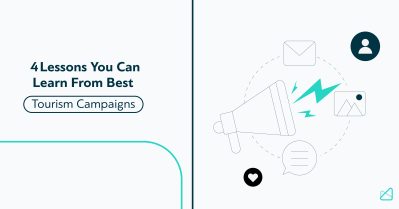
4 Lessons You Can Learn From the Best Tourism Campaigns
13 min. Businesses in the tourism industry rely heavily on marketing to generate leads and boost conversion rates. Tourism marketing is as old as tourism itself – and it always reflects the destination and service benefits relevant to the current travelers’ needs, wants, and expectations. In other words, tourism campaigns must constantly move forward, and […]

The Vital Role of Market Segmentation in the Tourism Industry
15 min. The tourism industry is an ever-growing and competitive landscape, presenting both challenges and opportunities for businesses operating within it. This is where market segmentation comes in handy. In this blog post, we will discuss what market segmentation is, the importance of market segmentation in the tourism industry, and how online travel agencies can […]
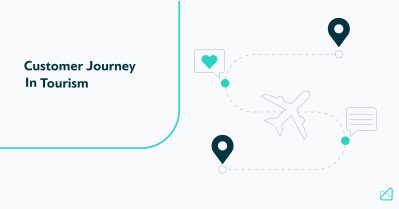
This is the Way to Create Memorable Customer Journeys in Travel and Tourism
21 min. The travel and tourism industry is an increasingly competitive space, with customers expecting more personalized and memorable experiences from their trips. With the rise of technology and social media, travelers have greater access to information and a wider range of options than ever before. Journey mapping offers travel agencies a way to gain […]
